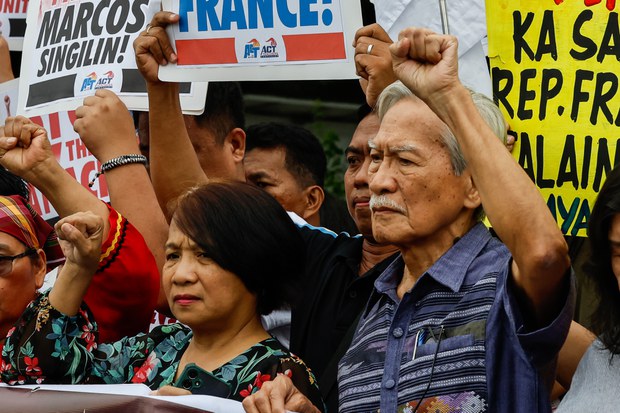Philippine court convicts two left-leaning politicians of violating child protection laws
2024.07.15
Manila
 Former House of Representatives member Satur Ocampo and ACT Teachers Party-list Rep. France Castro raise clenched fists during a protest in Manila, July 15, 2024. The protest happened after a court convicted the two left-leaning politicians and several others for violating child protection laws.
Former House of Representatives member Satur Ocampo and ACT Teachers Party-list Rep. France Castro raise clenched fists during a protest in Manila, July 15, 2024. The protest happened after a court convicted the two left-leaning politicians and several others for violating child protection laws.
A Philippine court on Monday convicted two left-leaning politicians and several others of violating child protection laws when they removed indigenous youth from a school caught in the crossfire between pro-government militias and communist rebels.
The court in the southern province of Davao Del Norte sentenced House of Representatives member France Castro, former lawmaker Satur Ocampo and 11 other people to prison terms of up to six years. Castro and Ocampo, who are free on appeal, said the convictions were “unacceptable and unjust.”
The case highlights the continuing vulnerability of indigenous Lumad peoples in the country’s southern Mindanao region, which has been beset for decades by conflicts between the state and armed groups including Muslim separatists, communists and criminal gangs.
Activists, meanwhile, said the ruling shows how courts in the Philippines have been weaponized against human rights defenders.
Castro, Ocampo and their co-defendants were accused of removing indigenous youth aged 14-17 years from a school without parental consent during a November 2018 aid convoy in Mindanao.
Judge Jimmy Boco of the Tagum City Regional Trial Court said the prosecution established beyond reasonable doubt that the accused “committed acts detrimental to the safety and well-being” of Lumad minors in Talaingod town of Davao Del Norte province.
Aside from prison sentences, he ordered the defendants to pay 20,000 pesos (U.S. $341) in moral and civil damages to each of the victims.
Castro and Ocampo had characterized their actions as a “rescue mission” of endangered indigenous children.
They argued they were responding to calls from the Lumad community who were allegedly “threatened and harassed by military and paramilitary forces” over alleged ties to communist rebels.
“This wrongful conviction speaks of the continuing persecution of those who are helping and advocating for the rights of Lumad children and the persistent attacks on Lumad schools and communities,” Castro and Ocampo said in a statement.
Lumad is an umbrella term for several indigenous peoples in Mindanao who are predominantly non-Christian and non-Muslim. The mainly Catholic Philippines has a sizable Muslim minority centered on southern regions such as Mindanao.
Philippine authorities have accused some left-leaning politicians and groups of fronting for communist rebels and using schools to radicalize Lumad children.
Castro and Ocampo belong to the left-leaning Makabayan bloc in the House of Representatives. The court ruling came a week after Makabayan announced it would field 12 candidates in the 2025 senatorial elections.
Mixed reactions
National Security Adviser Secretary Eduardo Año hailed the court decision.
“It doesn't matter if you are prominent in society, the law is the law and one has to be accountable for one's actions,” he said in a statement.
The National Task Force to End Local Communist Armed Conflict described Monday’s ruling as justice served in a “landmark case.”
Ocampo and Castro “were given their day in court,” said Ernesto Torres Jr., the task force’s executive director. “They were assisted by a battalion of lawyers and their case was found wanting. They should accept the court’s decision because we are a nation of laws,” he said.
A group of Southeast Asian parliamentarians, however, assailed the ruling.
“It is an absurd decision that has no basis in reality,” said Mercy Ch. Barends, chairwoman of ASEAN Parliamentarians for Human Rights.
“We stand in solidarity with Rep. France Castro and her fellow human rights defenders and we further call on the higher courts to recognize the ridiculousness of this case and duly overturn this preposterous conviction,” Barends said in a statement.
Philippine rights group Karapatan said the verdict shows courts are increasingly weaponized against human rights defenders.
“We denounce this court ruling, as the double standard in our justice system remains so stark,” Cristina Palabay, Karapatan’s secretary-general, told BenarNews on Monday.
“The moneyed and powerful are acquitted while those who advocate for the rights of the Lumad and other vulnerable sectors of society are repeatedly violated,” she said.
Castro and Ocampo also called for an end to attacks on Lumad communities, which they claimed intensified during the administration of former leader Rodrigo Duterte and have continued to persist under the presidency of Ferdinand Marcos Jr.
When he became president in 2016, Duterte engaged the communist rebels in peace talks and even appointed some left-leaning personalities to his cabinet.
That gesture however was short-lived, and the negotiations aimed at ending one of Asia’s longest-running insurgencies came to a halt in 2017 after both sides accused each other of continuing with the violence.
Jojo Riñoza and Gerard Carreon from Manila and Jeoffrey Maitem from Davao City, southern Philippines contributed to this report.







